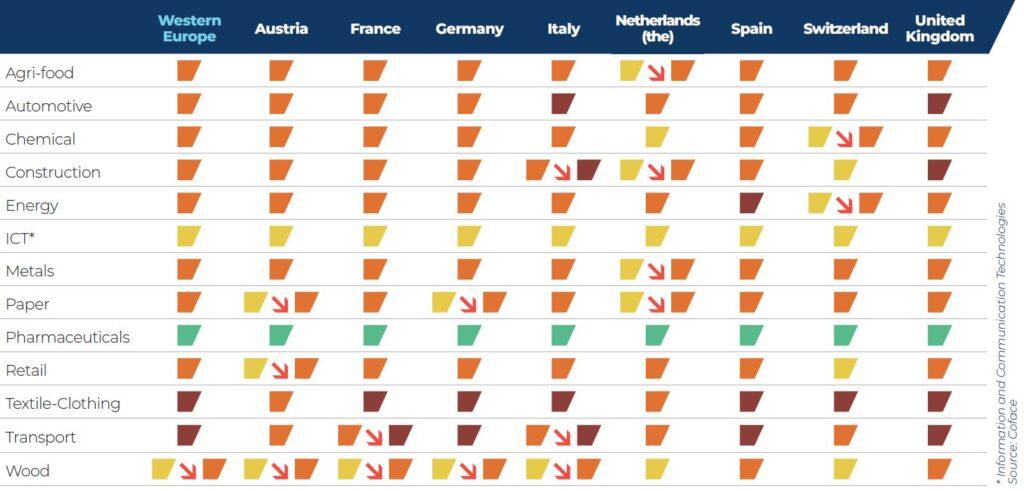Last month, our Economic Research team released the Q3 2022 Country and Sector Risk Barometer, which highlights Coface’s assessment of the level of risk in different countries and sectors. In the latest Barometer, 19 countries had their ratings downgraded, and there were 49 downgrades across our sector assessments.
This provides for gloomy reading worldwide, but what is happening in the UK? Christophe Souquet, Underwriting Director for Coface UK and Ireland, has provided his insight into the current economic climate in the UK.
United Kingdom country risk analysis

The UK economy has been badly hit by inflation (above 10%, source: Office for National Statistics (ONS)), soaring energy costs, and high interest rates. Household disposable income is falling, and consumer confidence is at a record low.
Low growth (circa 2%, source ONS), high inflation, and lower government support for UK businesses are all contributing factors and are strong non-payment indicators.
Business insolvencies continue to rise sharply in the UK (+18% vs. September 2021, +84% vs. September 2020, and +11% vs. September 2019; source: ONS).
United Kingdom sector risk analysis

All industries are contributing to the rise in insolvencies, though construction, retail, and personal services (especially the hospitality industry) are probably the most sensitive ones. Construction is usually the first sector affected by cycle changes.
We are seeing an increasing number of companies, not only SMEs, struggling at the moment. Materials shortages are having an impact on costs with the implementation of price rises along the supply chain, leading to more companies struggling with cash flow management.
Construction
The recent insolvency of Avonside Group Services, one of the largest UK roofing contractors, is a good example of growing difficulties in the construction sector. 2023 might be a challenging year for the construction sector, with new orders dropping to low levels. All areas of the construction sector might be impacted (residential and commercial construction, civil engineering).
Retail
The retail sector is also struggling at the moment. All main sub-sectors are being impacted (food and non-food retail, department stores, specialised stores, high-street retail chains, and online retailers).
Several insolvencies were seen in the sector during the pandemic period, with a high volume of store closures and business restructuring through the CVA process. However, following an increase in footfall as stores re-opened, rising inflation, interest rate rises, and higher energy costs are now affecting consumer sentiment, which has curbed spending.
The brick and mortar model suffers due to high fixed costs, but we have also seen pure online businesses go bankrupt due to falling demand (the most recent one being made.com).
Traditional supermarket chains are under fierce competition from new types of players. The dominance of the Big 4 (Tesco, Asda, Sainsbury, and Morrisons) has come under increasing threat from hard discounter chains headed by Aldi and Lidl. Asda and Morrison’s have particularly struggled against the new competition.
Other sectors
The automotive sector (shortages in the global supply chain, especially electronic components, commercial impacts from the China Zero COVID policy) and, to a lesser extent, the transport sector (improving demand but companies often suffering from tight liquidity and weak balance sheet structure) also continue to suffer in the UK.
On the other hand, the pharmaceutical industry remains fairly resilient.
Is a recession on the horizon?
While our research team has significantly downgraded their growth forecasts for 2023 in all regions worldwide, Europe is undoubtedly the one whose outlook has darkened the most over the summer. Thus, a recession seems inevitable in all major European economies this winter, and most of them will even record negative growth for the year as a whole.
Bruno Fernandes, Head of Macroeconomic Research at Coface, explains: “Whether it takes the form of a “voluntary” reduction (suspension of activities that have become unprofitable because of energy costs) or forced rationing decreed by governments, the drop in energy consumption will probably result in lower production and a decline in GDP, the extent of which will depend largely on the severity of the winter.”
“The Bank of England (BoE) and the European Central Bank (ECB) are forced to hike their key rates at a much faster pace than expected, due to the acceleration of core inflation, but also to limit the depreciation of the pound sterling and the euro against the dollar, which fuels imported inflation.”
“In addition to the observed or anticipated interest rate differential with the US dollar, these currencies are being dragged down by expectations of an imminent recession in Europe and by the considerable widening of the UK and Eurozone trade deficits this year due, in particular, to their soaring energy bills.”


Christophe Souquet (left), Underwriting Director, Coface UK and Ireland
Bruno Fernandes (right), Head of Macroeconomic Research, Coface